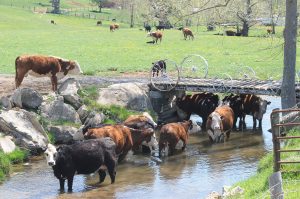
Va. DCR Aerial Survey of Rockingham County Found 59 Percent of Livestock Parcels Lack Streamside Fencing
Washington, D.C. – With less than five years to go before a Virginia’s Chesapeake Bay cleanup deadline of fencing all cattle out of streams to reduce water pollution, farmers in the state’s biggest agricultural county have failed to install livestock fencing on 59 percent of pastures, according to a new state study.
The survey of aerial photos by the Virginia Department of Conservation and Recreation (DCR) found that only 41 percent of the farm parcels with livestock in Rockingham County (or 419 out of 1,023) had fenced their cattle out of streams in 2018.
This is despite the fact that Virginia last August promised the U.S. Environmental Protection Agency that all streams on cattle farms will be protected with livestock fencing by 2025 to reduce fecal bacteria, sediment and other pollutants.
A new state law signed by Governor Northam on April 11 could mandate livestock fencing, which is currently voluntary, starting in 2026 if farmers fail to meet the state goal. But so far, progress in convincing farmers to voluntarily adopt this best management practice to reduce water pollution has averaged only 1 percent per year over the last 16 years, according to the DCR study.
“Virginia is going to fall far short of its own Chesapeake Bay cleanup goals if it doesn’t really step up the pace with reducing this agricultural pollution over the next five years,” said Eric Schaeffer, Executive Director of the Environmental Integrity Project and former Director of Civil Enforcement at EPA.
Mark Frondorf, the Shenandoah Riverkeeper, said: “Herds of cattle defecating and knocking sediment into Shenandoah waterways create high levels of fecal bacterial that make it unsafe to swim or raft in some areas. Allowing livestock into the river also has a devastating impact on the ecosystem, including by causing algae blooms that ruin the waterways for anglers and everyone else who loves the Shenandoah. If farmers don’t want a fencing mandate in five years, they need to make the choice to be good stewards and clean up their local streams.”
He added that the new Virginia legislation (SB704) provides state funds for cattle fencing and nutrient management plans so that the financial burden on pollution control does not fall wholly on the farming community.
Solutions to the problem could include Virginia paying farmers higher reimbursement rates to install streamside fencing, providing up-front payments and better loan terms to farmers, or simply mandating that all cattle operations exclude their animals from streams, according to an April 2019 report by the Environmental Integrity Project (EIP) and the Shenandoah Riverkeeper, “Livestock Fencing in the Shenandoah Valley.”
That report examined aerial photography and found that 81 percent of farms with livestock in Rockingham and neighboring Augusta counties had failed to fence their cattle out of streams in 2016-2017.
The EIP/Shenandoah Riverkeeper report raised questions that inspired the DCR study of the issue, but relied on a different methodology which could explain why the results differed. DCR’s study examined only perennial streams (those that run year-round), while the EIP/Shenandoah Riverkeeper study considered all streams, including intermittent and seasonal streams. DCR looked at parcels of farmland, while EIP looked at whole farms (each of which can contain many parcels.)
The DCR study, completed in March but released this week, found that 24 percent of farm parcels with livestock in Rockingham County (or 281 of 1,163) had fences to keep the animals out of streams in 2002. That percentage increased to 28 percent (334 out of 1,215) in 2007; 31 percent (384 of 1,238) in 2011; and 41 percent (419 of 1,023) in 2018.
For a copy of the DCR study, click here.
For a copy of the EIP/Shenandoah Riverkeeper study, click here.
The Environmental Integrity Project is an 18-year-old, nonprofit, nonpartisan organization based in Washington, D.C., that protects public health and the environment by investigating polluters, holding them accountable under the law, and strengthening public policy.
Shenandoah Riverkeeper is part of the Potomac Riverkeeper Network, a member-supported nonprofit organization founded in 2000 whose mission is to protect the public’s right to clean water in the Potomac and Shenandoah Rivers.
Media contacts: Tom Pelton, Environmental Integrity Project, tpelton@environmentalintegrity.org or (443) 510-2574
Mark Frondorf, Shenandoah Riverkeeper, mark@shenandoahriverkeeper.org or (571) 969-0746


